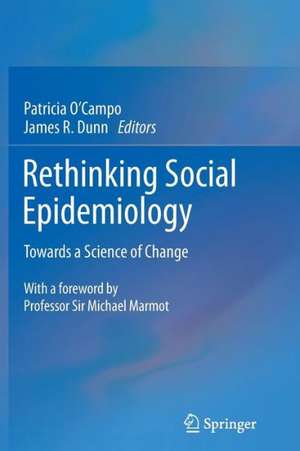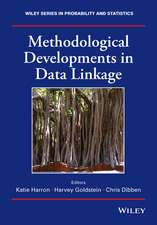Rethinking Social Epidemiology: Towards a Science of Change
Editat de Patricia O’Campo, James R. Dunnen Limba Engleză Paperback – 30 noi 2013
| Toate formatele și edițiile | Preț | Express |
|---|---|---|
| Paperback (1) | 1097.71 lei 6-8 săpt. | |
| SPRINGER NETHERLANDS – 30 noi 2013 | 1097.71 lei 6-8 săpt. | |
| Hardback (1) | 1104.84 lei 6-8 săpt. | |
| SPRINGER NETHERLANDS – 5 oct 2011 | 1104.84 lei 6-8 săpt. |
Preț: 1097.71 lei
Preț vechi: 1155.48 lei
-5% Nou
Puncte Express: 1647
Preț estimativ în valută:
210.05€ • 228.88$ • 176.99£
210.05€ • 228.88$ • 176.99£
Carte tipărită la comandă
Livrare economică 23 aprilie-07 mai
Preluare comenzi: 021 569.72.76
Specificații
ISBN-13: 9789400797390
ISBN-10: 9400797397
Pagini: 360
Ilustrații: X, 350 p.
Dimensiuni: 155 x 235 x 19 mm
Greutate: 0.5 kg
Ediția:2012
Editura: SPRINGER NETHERLANDS
Colecția Springer
Locul publicării:Dordrecht, Netherlands
ISBN-10: 9400797397
Pagini: 360
Ilustrații: X, 350 p.
Dimensiuni: 155 x 235 x 19 mm
Greutate: 0.5 kg
Ediția:2012
Editura: SPRINGER NETHERLANDS
Colecția Springer
Locul publicării:Dordrecht, Netherlands
Public țintă
Professional/practitionerCuprins
Foreword.-1. Introduction. Section I: Foundations.-2 “Explanation,” Philosophy and Theory in Health Inequalities Research: Towards a Critical Realist Approach.-3 Values and Social Epidemiologic Research.-4 Population-based Data and Community Empowerment.-5 Differences That Matter. Section II: Context.- 6 Place-based Stress and Chronic Disease: A Systems View of Environmental Determinants.-7 How Goes The Neighbourhood? Rethinking Neighbourhoods and Health Research in Social Epidemiology.-8 Application of Two Schools of Social Theory to Neighbourhood, Place and Health Research.-9 Locating Politics in Social Epidemiology. Section III: Research Tools in Action.-10 Structural Violence and Structural Vulnerability within the Risk Environment: Theoretical and Methodological Perspectives for a Social Epidemiology of HIV Risk among Injection Drug Users and Sex Workers.-11 Realist Review Methods for Complex Health Problems.- 12 Addressing Health Equities in Social Epidemiology: Learning from Evaluation(s).Section IV: Making a Difference.-13 Knowledge Translation and Social Epidemiology: Taking Power, Politics and Values Seriously.-14 Community-Academic Partnerships and Social Change.-15 Producing More Relevant Evidence: Applying a Social Epidemiology Research Agenda to Public Health Practice.-16 Conclusions. Index.
Textul de pe ultima copertă
To date, much of the empirical work in social epidemiology has demonstrated the existence of health inequalities along a number of axes of social differentiation. However, this research, in isolation, will not inform effective solutions to health inequalities. Rethinking Social Epidemiology provides an expanded vision of social epidemiology as a science of change, one that seeks to better address key questions related to both the causes of social inequalities in health (problem-focused research) as well as the implementation of interventions to alleviate conditions of marginalization and poverty (solution-focused research). This book is ideally suited for emerging and practicing social epidemiologists as well as graduate students and health professionals in related disciplines.
Caracteristici
Rethinking Social Epidemiology is one of the first texts that links “evidence to action” to ensure that social epidemiologic research can meaningfully affect social and health policy change This book focuses on producing actionable evidence on social inequalities by expanding upon current practice and introducing new social epidemiologic methods Unlike any other social epidemiology texts, this book offers a philosophically informed approach to major scientific debates within the field This book is applicable to a broad audience as it is written for and by social epidemiologists as well as non-academic users of social epidemiologic knowledge













